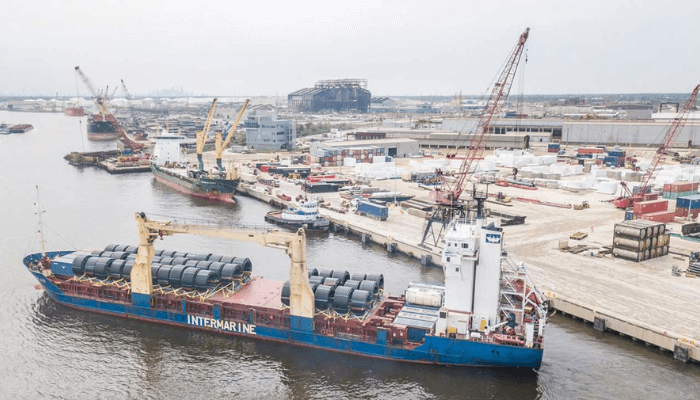
Seven daughter vessels carrying a combined total of 150 million litres of petrol trapped on the high sea at the Escravos channel, a key oil terminal in the Niger Delta, have been identified as the reason for the current supply crises.
BusinessDay learnt there is a shortage of daughter vessels to evacuate more than enough petroleum products from mother vessels to Nigerian jetties and terminals due to the seven vessels trapped at Escravos, leading to breaks in the supply chain.
“The supply chain in Nigeria is very fragile at times. It’s very complicated, and there are only small things like bad weather or low tide that need to go wrong to cause some disruption,” Huub Stokman, the managing director of NNPC Retail Limited and chairman of the Major Energy Marketers Association of Nigeria said.
He added, “Five empty vessels expected to deliver fuel to the Warri area cannot get out of Escravos, while two vessels laden with products are waiting to go through the Escravos channel.
“This has lingered for a couple of days. This means if you have seven vessels carrying 150 million litres of PMS that can’t load again or bring in the next products, we will have disruption in the whole value chain,” Stokman said.
Other oil traders told BusinessDay that due to the shortage of the daughter vessels, it now takes extra days for vessels to make a trip, thus compounding the challenges around petroleum distribution and evacuation.
This disruption to the petrol supply chain has led to long queues and pump shortages at gas stations across the country.
“I’ve been waiting here for over two hours just to get half a tank of petrol,” said Afolabi Akintola, a Lagos resident. “This is becoming a real nightmare.”
Another major challenge facing the downstream sector is the advent of Nigeria’s giant Dangote oil refinery, a development expected to bring an end to a decades-long gasoline trade from Europe to Africa worth $17 billion a year, heaping pressure on European refineries already at risk of closure from heightened competition.
“Tightness in vessels is expected because traders are anticipating that with the advent of Dangote, and what is happening with diesel, oil vessel business will die,” a senior oil executive in the downstream business told BusinessDay.
“For most businessmen, this is the best time to rather sell their vessel or terminate vessel lease while they still can get a good deal”.
“Any vessels below 20kt are expected to be businesses with the incoming Dangote refinery,” he added.
On Thursday, Oil traders said there are more than products on mother ships in Nigeria’s waters waiting for vessels to transfer products.
“We are indeed flooding the market from increased supplies from NNPCL and short-term hiring and reallocation of vessels; the queues will go with a massive effort in a few days. However, the fundamentals still need to be addressed, especially how and on what terms Dangote enters the market,” a source said.
The Dangote refinery started production in January and cost $20 billion to build. It can refine up to 650,000 barrels per day (bpd) and will be the largest in Africa and Europe when it reaches full capacity this or next year.
It has long been touted as the turning point for Nigeria’s quest for energy independence. Nigeria is Africa’s most populous nation and its top oil producer, yet it imports almost all its fuel due to lack of refining capacity.
About a third of Europe’s 1.33 million bpd average gasoline exports in 2023 went to West Africa, a bigger chunk than any other region, with the majority of those exports ending up in Nigeria, Kpler data shows.
“The loss of the West African market will be problematic for a small set of refineries that do not have the kit to upgrade their gasoline to European and U.S. specification,” consultancy FGE’s head of refined products Eugene Lindell said, referring to more stringent environmental standards for other markets.
As much as 300-400,000 bpd of refining capacity in Europe is at risk of closure because of rising global gasoline production, according to Kpler’s analyst Andon Pavlov.
A European refinery executive who declined to be identified said coastal refineries that are geared for exports will be more exposed while inland refineries are less vulnerable because they rely on local demand.
“The changes won’t happen overnight, but they could ultimately lead to closures of refineries and their conversion to storage terminals,” he added, referring to the challenging market environment.










